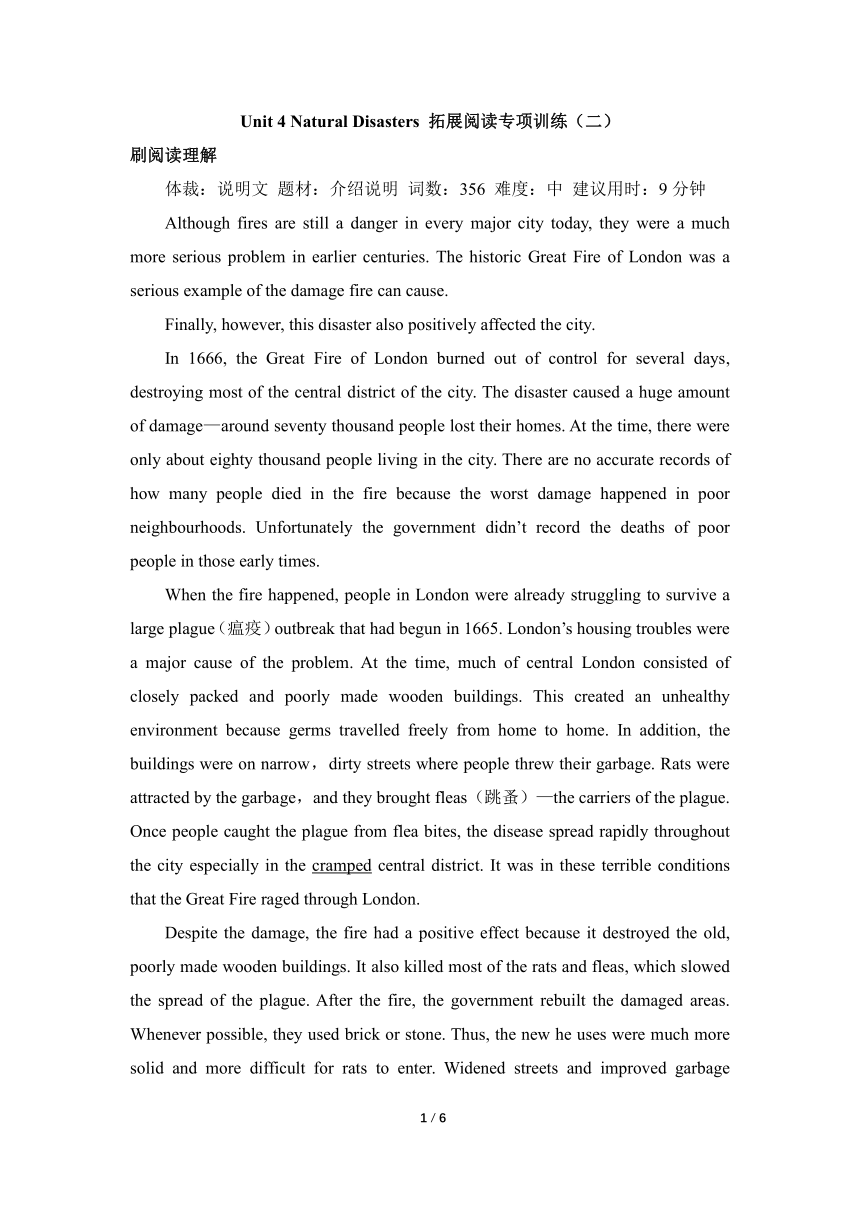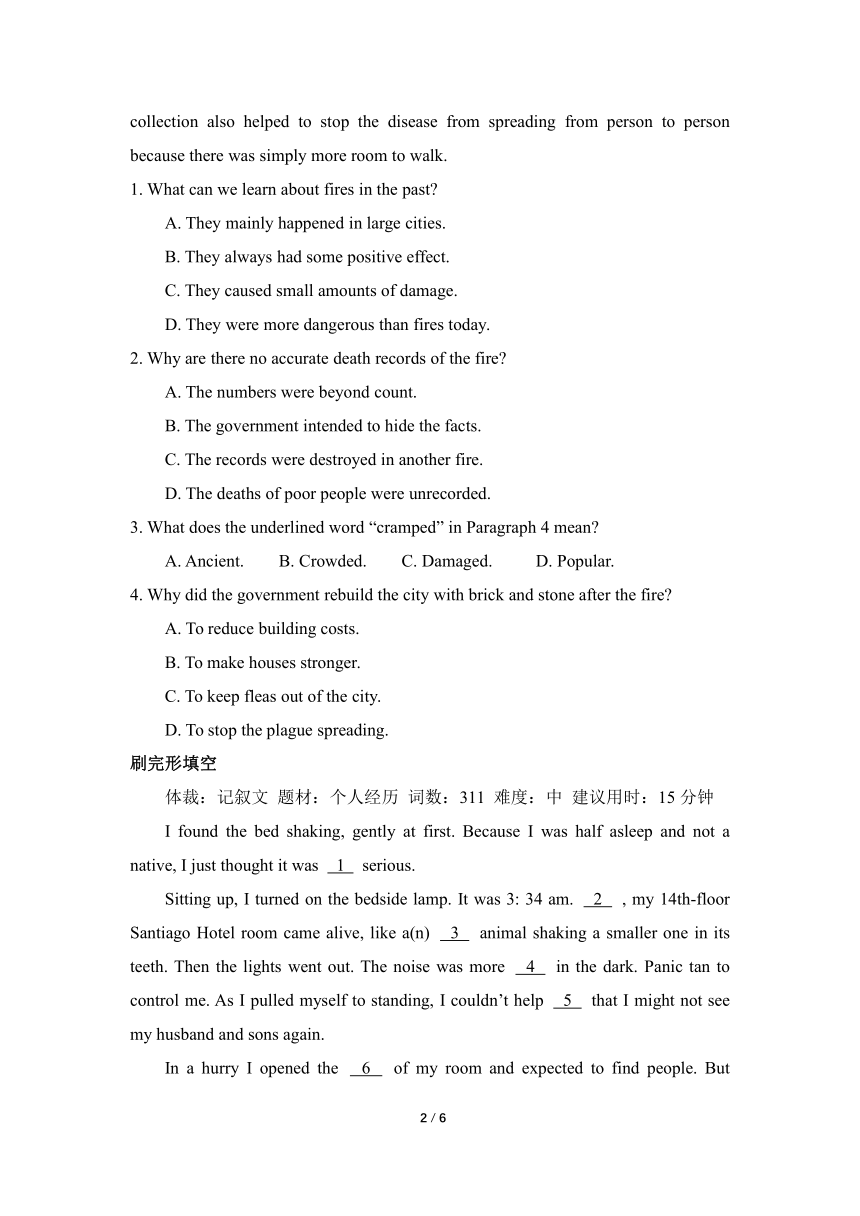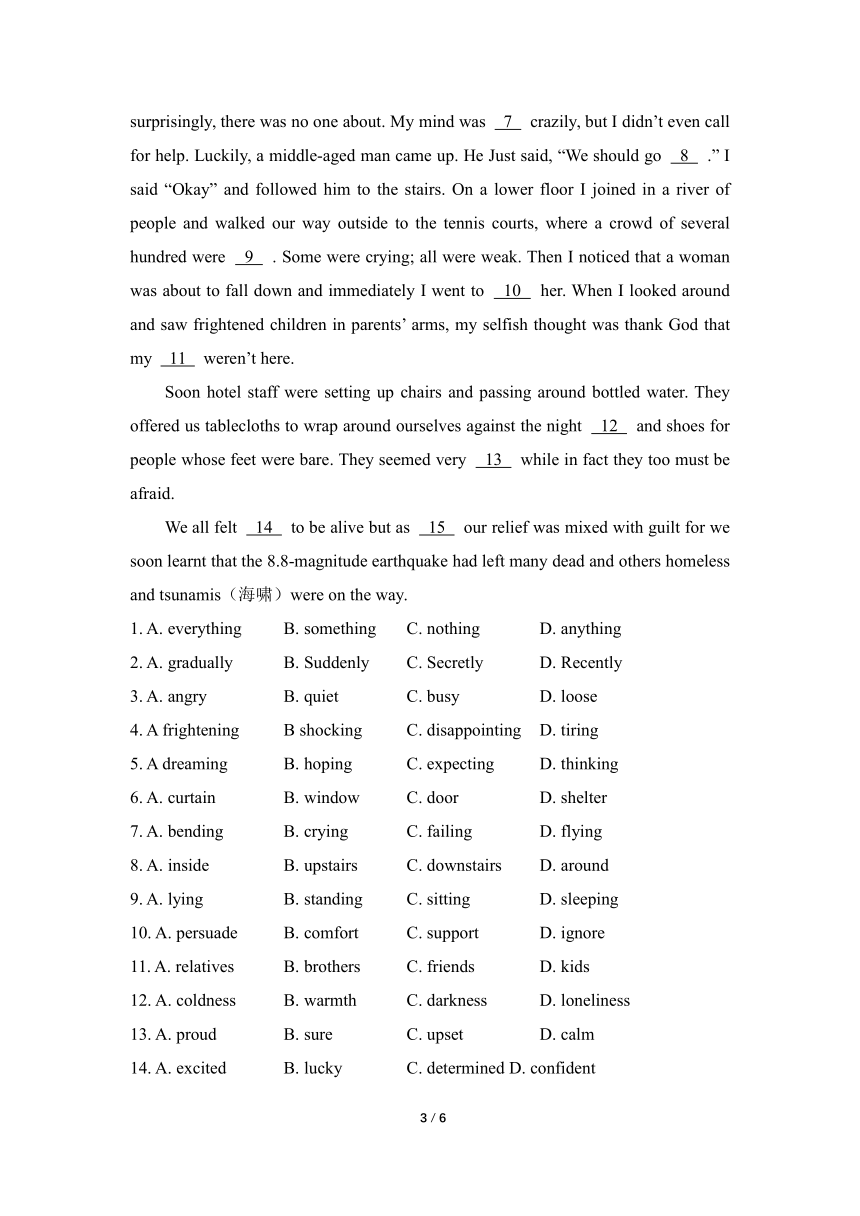人教版(2019)必修第一册 Unit4 Natural disasters拓展阅读专项训练(二)(有解析)
文档属性
| 名称 | 人教版(2019)必修第一册 Unit4 Natural disasters拓展阅读专项训练(二)(有解析) |  | |
| 格式 | docx | ||
| 文件大小 | 19.8KB | ||
| 资源类型 | 教案 | ||
| 版本资源 | 人教版(2019) | ||
| 科目 | 英语 | ||
| 更新时间 | 2023-03-09 11:52:02 | ||
图片预览



文档简介
Unit 4 Natural Disasters 拓展阅读专项训练(二)
刷阅读理解
体裁:说明文 题材:介绍说明 词数:356 难度:中 建议用时:9分钟
Although fires are still a danger in every major city today, they were a much more serious problem in earlier centuries. The historic Great Fire of London was a serious example of the damage fire can cause.
Finally, however, this disaster also positively affected the city.
In 1666, the Great Fire of London burned out of control for several days, destroying most of the central district of the city. The disaster caused a huge amount of damage—around seventy thousand people lost their homes. At the time, there were only about eighty thousand people living in the city. There are no accurate records of how many people died in the fire because the worst damage happened in poor neighbourhoods. Unfortunately the government didn’t record the deaths of poor people in those early times.
When the fire happened, people in London were already struggling to survive a large plague(瘟疫)outbreak that had begun in 1665. London’s housing troubles were a major cause of the problem. At the time, much of central London consisted of closely packed and poorly made wooden buildings. This created an unhealthy environment because germs travelled freely from home to home. In addition, the buildings were on narrow,dirty streets where people threw their garbage. Rats were attracted by the garbage,and they brought fleas(跳蚤)—the carriers of the plague. Once people caught the plague from flea bites, the disease spread rapidly throughout the city especially in the cramped central district. It was in these terrible conditions that the Great Fire raged through London.
Despite the damage, the fire had a positive effect because it destroyed the old, poorly made wooden buildings. It also killed most of the rats and fleas, which slowed the spread of the plague. After the fire, the government rebuilt the damaged areas. Whenever possible, they used brick or stone. Thus, the new he uses were much more solid and more difficult for rats to enter. Widened streets and improved garbage collection also helped to stop the disease from spreading from person to person because there was simply more room to walk.
1. What can we learn about fires in the past
A. They mainly happened in large cities.
B. They always had some positive effect.
C. They caused small amounts of damage.
D. They were more dangerous than fires today.
2. Why are there no accurate death records of the fire
A. The numbers were beyond count.
B. The government intended to hide the facts.
C. The records were destroyed in another fire.
D. The deaths of poor people were unrecorded.
3. What does the underlined word “cramped” in Paragraph 4 mean
A. Ancient. B. Crowded. C. Damaged. D. Popular.
4. Why did the government rebuild the city with brick and stone after the fire
A. To reduce building costs.
B. To make houses stronger.
C. To keep fleas out of the city.
D. To stop the plague spreading.
刷完形填空
体裁:记叙文 题材:个人经历 词数:311 难度:中 建议用时:15分钟
I found the bed shaking, gently at first. Because I was half asleep and not a native, I just thought it was 1 serious.
Sitting up, I turned on the bedside lamp. It was 3: 34 am. 2 , my 14th-floor Santiago Hotel room came alive, like a(n) 3 animal shaking a smaller one in its teeth. Then the lights went out. The noise was more 4 in the dark. Panic tan to control me. As I pulled myself to standing, I couldn’t help 5 that I might not see my husband and sons again.
In a hurry I opened the 6 of my room and expected to find people. But surprisingly, there was no one about. My mind was 7 crazily, but I didn’t even call for help. Luckily, a middle-aged man came up. He Just said, “We should go 8 .” I said “Okay” and followed him to the stairs. On a lower floor I joined in a river of people and walked our way outside to the tennis courts, where a crowd of several hundred were 9 . Some were crying; all were weak. Then I noticed that a woman was about to fall down and immediately I went to 10 her. When I looked around and saw frightened children in parents’ arms, my selfish thought was thank God that my 11 weren’t here.
Soon hotel staff were setting up chairs and passing around bottled water. They offered us tablecloths to wrap around ourselves against the night 12 and shoes for people whose feet were bare. They seemed very 13 while in fact they too must be afraid.
We all felt 14 to be alive but as 15 our relief was mixed with guilt for we soon learnt that the 8.8-magnitude earthquake had left many dead and others homeless and tsunamis(海啸)were on the way.
1. A. everything B. something C. nothing D. anything
2. A. gradually B. Suddenly C. Secretly D. Recently
3. A. angry B. quiet C. busy D. loose
4. A frightening B shocking C. disappointing D. tiring
5. A dreaming B. hoping C. expecting D. thinking
6. A. curtain B. window C. door D. shelter
7. A. bending B. crying C. failing D. flying
8. A. inside B. upstairs C. downstairs D. around
9. A. lying B. standing C. sitting D. sleeping
10. A. persuade B. comfort C. support D. ignore
11. A. relatives B. brothers C. friends D. kids
12. A. coldness B. warmth C. darkness D. loneliness
13. A. proud B. sure C. upset D. calm
14. A. excited B. lucky C. determined D. confident
15. A. visitors B. reporters C. survivors D. rescuers
答案:
刷阅读理解
【语篇导读】本文是一篇说明文。作者介绍了发生在1666年的伦敦大火在给人们带来毁灭的同时,也给这座城市带来了积极的影响。
1. D细节理解题。根据第一段中的 they were a much more serious problem in earlier centuries可知,过去发生的大火是更加严重的问题,也就是说,它们给人类带来的危害更大。故选D项。
2. D细节理解题。根据第三段的最后一句 Unfortunately,the government didnt record the deaths of poor people in those early times.可知,当时政府没有对穷人的死亡人数进行记录,所以无法知道在大火中死亡的确切人数。故选D项。
3. B词义猜测题。根据画线词前面的 the disease spread rapidly及后面的 in these terrible conditions可知,在拥挤的市中心疾病会很快地传播。故选B项。
4. B细节理解题。根据最后一段的Thus, the new houses were much more solid and more difficult for rats to enter.可知,用砖和石头建的房子更结实一些。故选B项。
刷完形填空
【语篇导读】本文是一篇记叙文。作者是一次8.8级地震中的幸存者。本文讲述了她在地震中的经历。
1. C根据本空前的 I found the bed shaking, gently at first. Because I was half asleep and not a native可知,作者认为没什么大问题。故选C项。
2. B根据上文说作者原本以为没什么大问题,再结合本空后的my 14th-floor Santiago Hotel room came alive可知,这是突然发生的事情。故选B项。
3. A根据设空前的myl4th-loor Santiago Hotel room came alive和本空后的 animal shaking a smaller one in its teeth可知,此处是说晃动的大楼像一个恼怒的动物用牙晃动一个小动物似的。故选A项。
4. A根据上文说的灯突然熄灭可知,作者是觉得黑暗中的噪音变得更可怕。故选A项。
5. D根据本空后的 I might not see my husband and sons again可知作者不禁想到可能再也见不到自己的丈夫和儿子了。故选D项。
6. C根据后文作者遇到一个男人并和他去楼梯可知,作者打开的是房门。故选C项。
7. B根据空后的 but I didn’t even call for help可知,作者的心里在拼命地呼救。cry意为“呼喊”。故选B项。
8.C根据空后的….followed him to the stairs. On a lower floor I joined in a river of people and walked our way outside to the tennis courts可知,中年男子建议一起下楼。故选C项。
9. B根据下文中的 Then I noticed that a woman was about to fall down及 hotel staff were setting up chairs可知,人们都在站着。故选B项。
10. C根据空前的 Then i noticed that a woman was about to fall down and immediately I went to.可知,作者去扶那个就要摔倒的妇女。support意为“支撑;帮助”,符合语境。故选C项。
11. D根据空前的 When I looked around and saw frightened children in parents’ arms,my selfish thought was thank God that…可知,作者庆幸自己的孩子没在现场。故选D项。
12. A根据语境可知,此处指一些旅馆的员工递给人们桌布,裹在身上以抵御夜里的寒冷。故选A项。
13. D根据空后的 while in fact they too must be afraid中的 while可知事实上旅馆的员工也很害怕,但是他们表现得很镇定。故选D项。
14. B根据空后的 to be alive可知,此处作者很庆幸他们还活着。故选B项。
15. C根据设空前后可知,此处作者是说作为8.8级地震的幸存者,她庆幸自己还活着,但还觉得有些愧疚。故选C项。
2 / 2
刷阅读理解
体裁:说明文 题材:介绍说明 词数:356 难度:中 建议用时:9分钟
Although fires are still a danger in every major city today, they were a much more serious problem in earlier centuries. The historic Great Fire of London was a serious example of the damage fire can cause.
Finally, however, this disaster also positively affected the city.
In 1666, the Great Fire of London burned out of control for several days, destroying most of the central district of the city. The disaster caused a huge amount of damage—around seventy thousand people lost their homes. At the time, there were only about eighty thousand people living in the city. There are no accurate records of how many people died in the fire because the worst damage happened in poor neighbourhoods. Unfortunately the government didn’t record the deaths of poor people in those early times.
When the fire happened, people in London were already struggling to survive a large plague(瘟疫)outbreak that had begun in 1665. London’s housing troubles were a major cause of the problem. At the time, much of central London consisted of closely packed and poorly made wooden buildings. This created an unhealthy environment because germs travelled freely from home to home. In addition, the buildings were on narrow,dirty streets where people threw their garbage. Rats were attracted by the garbage,and they brought fleas(跳蚤)—the carriers of the plague. Once people caught the plague from flea bites, the disease spread rapidly throughout the city especially in the cramped central district. It was in these terrible conditions that the Great Fire raged through London.
Despite the damage, the fire had a positive effect because it destroyed the old, poorly made wooden buildings. It also killed most of the rats and fleas, which slowed the spread of the plague. After the fire, the government rebuilt the damaged areas. Whenever possible, they used brick or stone. Thus, the new he uses were much more solid and more difficult for rats to enter. Widened streets and improved garbage collection also helped to stop the disease from spreading from person to person because there was simply more room to walk.
1. What can we learn about fires in the past
A. They mainly happened in large cities.
B. They always had some positive effect.
C. They caused small amounts of damage.
D. They were more dangerous than fires today.
2. Why are there no accurate death records of the fire
A. The numbers were beyond count.
B. The government intended to hide the facts.
C. The records were destroyed in another fire.
D. The deaths of poor people were unrecorded.
3. What does the underlined word “cramped” in Paragraph 4 mean
A. Ancient. B. Crowded. C. Damaged. D. Popular.
4. Why did the government rebuild the city with brick and stone after the fire
A. To reduce building costs.
B. To make houses stronger.
C. To keep fleas out of the city.
D. To stop the plague spreading.
刷完形填空
体裁:记叙文 题材:个人经历 词数:311 难度:中 建议用时:15分钟
I found the bed shaking, gently at first. Because I was half asleep and not a native, I just thought it was 1 serious.
Sitting up, I turned on the bedside lamp. It was 3: 34 am. 2 , my 14th-floor Santiago Hotel room came alive, like a(n) 3 animal shaking a smaller one in its teeth. Then the lights went out. The noise was more 4 in the dark. Panic tan to control me. As I pulled myself to standing, I couldn’t help 5 that I might not see my husband and sons again.
In a hurry I opened the 6 of my room and expected to find people. But surprisingly, there was no one about. My mind was 7 crazily, but I didn’t even call for help. Luckily, a middle-aged man came up. He Just said, “We should go 8 .” I said “Okay” and followed him to the stairs. On a lower floor I joined in a river of people and walked our way outside to the tennis courts, where a crowd of several hundred were 9 . Some were crying; all were weak. Then I noticed that a woman was about to fall down and immediately I went to 10 her. When I looked around and saw frightened children in parents’ arms, my selfish thought was thank God that my 11 weren’t here.
Soon hotel staff were setting up chairs and passing around bottled water. They offered us tablecloths to wrap around ourselves against the night 12 and shoes for people whose feet were bare. They seemed very 13 while in fact they too must be afraid.
We all felt 14 to be alive but as 15 our relief was mixed with guilt for we soon learnt that the 8.8-magnitude earthquake had left many dead and others homeless and tsunamis(海啸)were on the way.
1. A. everything B. something C. nothing D. anything
2. A. gradually B. Suddenly C. Secretly D. Recently
3. A. angry B. quiet C. busy D. loose
4. A frightening B shocking C. disappointing D. tiring
5. A dreaming B. hoping C. expecting D. thinking
6. A. curtain B. window C. door D. shelter
7. A. bending B. crying C. failing D. flying
8. A. inside B. upstairs C. downstairs D. around
9. A. lying B. standing C. sitting D. sleeping
10. A. persuade B. comfort C. support D. ignore
11. A. relatives B. brothers C. friends D. kids
12. A. coldness B. warmth C. darkness D. loneliness
13. A. proud B. sure C. upset D. calm
14. A. excited B. lucky C. determined D. confident
15. A. visitors B. reporters C. survivors D. rescuers
答案:
刷阅读理解
【语篇导读】本文是一篇说明文。作者介绍了发生在1666年的伦敦大火在给人们带来毁灭的同时,也给这座城市带来了积极的影响。
1. D细节理解题。根据第一段中的 they were a much more serious problem in earlier centuries可知,过去发生的大火是更加严重的问题,也就是说,它们给人类带来的危害更大。故选D项。
2. D细节理解题。根据第三段的最后一句 Unfortunately,the government didnt record the deaths of poor people in those early times.可知,当时政府没有对穷人的死亡人数进行记录,所以无法知道在大火中死亡的确切人数。故选D项。
3. B词义猜测题。根据画线词前面的 the disease spread rapidly及后面的 in these terrible conditions可知,在拥挤的市中心疾病会很快地传播。故选B项。
4. B细节理解题。根据最后一段的Thus, the new houses were much more solid and more difficult for rats to enter.可知,用砖和石头建的房子更结实一些。故选B项。
刷完形填空
【语篇导读】本文是一篇记叙文。作者是一次8.8级地震中的幸存者。本文讲述了她在地震中的经历。
1. C根据本空前的 I found the bed shaking, gently at first. Because I was half asleep and not a native可知,作者认为没什么大问题。故选C项。
2. B根据上文说作者原本以为没什么大问题,再结合本空后的my 14th-floor Santiago Hotel room came alive可知,这是突然发生的事情。故选B项。
3. A根据设空前的myl4th-loor Santiago Hotel room came alive和本空后的 animal shaking a smaller one in its teeth可知,此处是说晃动的大楼像一个恼怒的动物用牙晃动一个小动物似的。故选A项。
4. A根据上文说的灯突然熄灭可知,作者是觉得黑暗中的噪音变得更可怕。故选A项。
5. D根据本空后的 I might not see my husband and sons again可知作者不禁想到可能再也见不到自己的丈夫和儿子了。故选D项。
6. C根据后文作者遇到一个男人并和他去楼梯可知,作者打开的是房门。故选C项。
7. B根据空后的 but I didn’t even call for help可知,作者的心里在拼命地呼救。cry意为“呼喊”。故选B项。
8.C根据空后的….followed him to the stairs. On a lower floor I joined in a river of people and walked our way outside to the tennis courts可知,中年男子建议一起下楼。故选C项。
9. B根据下文中的 Then I noticed that a woman was about to fall down及 hotel staff were setting up chairs可知,人们都在站着。故选B项。
10. C根据空前的 Then i noticed that a woman was about to fall down and immediately I went to.可知,作者去扶那个就要摔倒的妇女。support意为“支撑;帮助”,符合语境。故选C项。
11. D根据空前的 When I looked around and saw frightened children in parents’ arms,my selfish thought was thank God that…可知,作者庆幸自己的孩子没在现场。故选D项。
12. A根据语境可知,此处指一些旅馆的员工递给人们桌布,裹在身上以抵御夜里的寒冷。故选A项。
13. D根据空后的 while in fact they too must be afraid中的 while可知事实上旅馆的员工也很害怕,但是他们表现得很镇定。故选D项。
14. B根据空后的 to be alive可知,此处作者很庆幸他们还活着。故选B项。
15. C根据设空前后可知,此处作者是说作为8.8级地震的幸存者,她庆幸自己还活着,但还觉得有些愧疚。故选C项。
2 / 2
